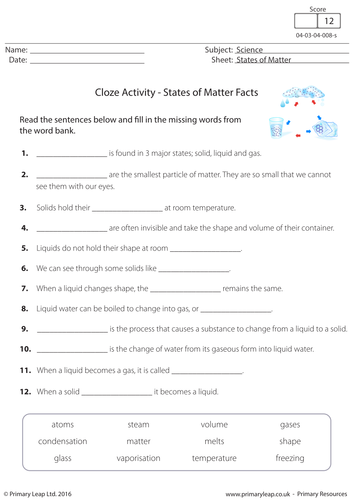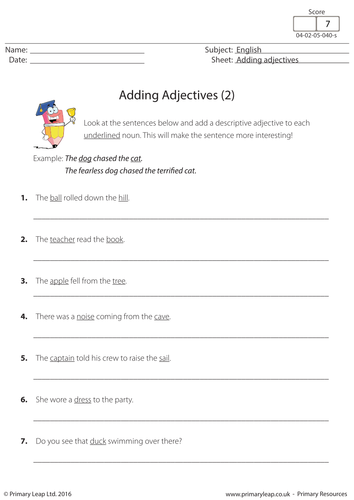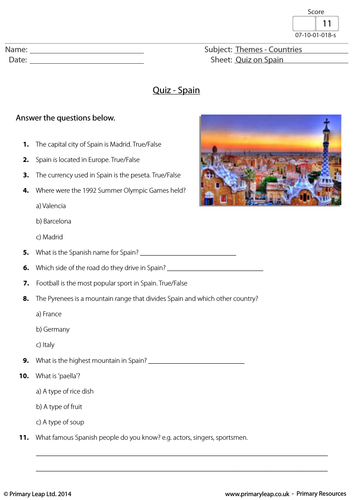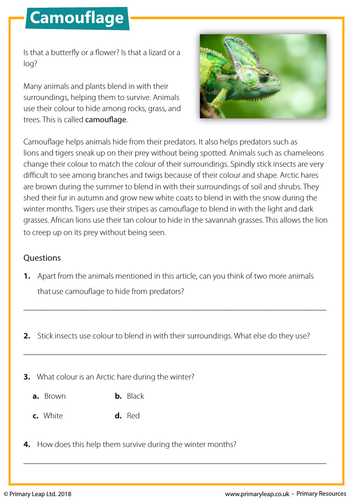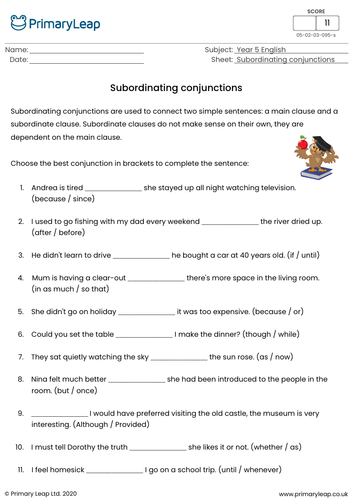506Uploads
475k+Views
216k+Downloads
All resources

Phonics - ee and ea
This worksheet was created by Lauren Savage @ Primary Leap
Learning phonics - a year 3 literacy worksheet that focuses on ‘ee’ and ‘ea’. Children must fill in the missing letters and sort the words correctly. This resource is great for reading and spelling.

Fractions and Decimals Year 4 (3)
This worksheet was created by Lauren Savage @ Primary Leap
Fractions and decimals represent the same things: numbers that are not whole numbers. Students are asked to convert decimals into fractions, then fractions into decimals, and then to circle the largest amount in each pair.

States of Matter - Science Resource
This cloze activity was created for primary students and asks them to read the sentences and fill in the missing words from the word bank.

Adding Adjectives (2)
Students are asked to add a descriptive adjective to each underlined noun. This will make the sentences more interesting and is good practice for story writing.

Word Search Activity - Alexander Graham Bell
Download this fun, word search activity to use as an extra resource when teaching students about Alexander Graham Bell. There are 15 words hidden in the puzzle. This worksheet was created by Lauren Savage @ Primary Leap

Equivalent Fractions - Year 4
This worksheet was created by Primary Leap
We can make equivalent fractions by multiplying or dividing both top and bottom by the same amount. Students are asked to complete the equivalent fractions.

Diminutives 2
Diminutives are affixes that mean small. It may be small in size or years. Students are asked to underline the diminutives in each sentence.
This worksheet was created by PrimaryLeap

Reading Comprehension - Robert Burns
This short reading comprehension was created by Lauren Savage @ Primary Leap and includes some facts about Robert Burns. Students are asked to answer the questions such as: ‘If you had met Robert Burns, what would you have spoken about?’ etc.

English worksheet - Adding the correct punctuation
This English resource was created by Primary Leap
Statements are sentences that tell you information about something. Questions are sentences that ask you something.
Students are asked to rewrite the sentences correctly, adding the correct punctuation.

KS2 English - Coordinating conjunctions
Coordinating conjunctions are used to connect sentences, words and phrases. They act as a kind of glue, linking the text together to help the sentences flow smoothly. This English resource asks students to choose the best conjunction in brackets to complete the sentences.
Worksheet created by Primary Leap

International Women's Day Word Search
International Women’s Day (IWD) is a global event that takes place on 8 March. It is a day to celebrate women’s achievements in a wide number of areas while calling for gender equality. Students are asked to find the words associated with International Women’s Day hidden in the puzzle. This resource was created by Primary Leap

Quiz on Spain
This worksheet includes 11 questions all about Spain. It can be used as an extra resource in your lessons or as a homework assignment.
This worksheet was created by Primary Leap

KS2 Reading Comprehension - Camouflage
This KS2 reading comprehension includes an interesting article about camouflage with questions to answer.
This worksheet was created by Primary Leap

KS1 Rosa Parks Reading Comprehension
**Rosa Parks reading comprehension activity
**
This short comprehension is tailored for KS1 pupils and aims to introduce them to the inspiring story of Rosa Parks. The multiple-choice questions help children engage with the text, practise their reading skills, and think critically about the important message of courage and equality.
This worksheet was created by Primary Leap **

Relative clauses
Relative clauses are used to connect sentences. We use relative clauses to give additional information about something without starting a new sentence. The most common relative pronouns are: who, whom, whose, which and that. This English resource asks students to choose the best relative pronoun to complete the sentences.
This worksheet was created by Lauren Savage

KS2 English - Subordinating conjunctions
Subordinating conjunctions are used to connect two simple sentences: a main clause and a subordinate clause. Subordinate clauses do not make sense on their own, they are dependent on the main clause. This English activity asks students to choose the best conjunction in brackets to complete the sentences.
Resource created by Lauren Savage

International Women's Day Fact Sheet
Kids learn some interesting facts about International Women’s Day, the main aims of the event, when the day was officially adopted and interesting statistics.
This worksheet was created by Lauren Savage @ Primary Leap

KS2 Cloze Exercise - Evolution Facts
This KS2 cloze exercise asks students to read the facts about evolution and fill in the missing words. A word bank has been included to help them.
This worksheet was created by Primary Leap

KS2 English Worksheet - Using 'Did' and 'Done'
This worksheet was created by Lauren Savage @ Primary Leap
Children complete the sentences by choosing ‘did’ or ‘done’.

Labelling Parts of the Human Body
How well do your students know the parts of the human body? This worksheet was created for young learners to help them label the parts of the human body. It will also help with their spelling skills. Find more resources at Primary Leap



